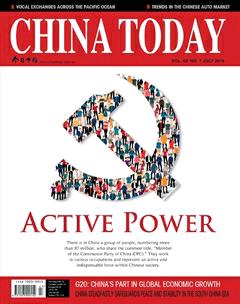Shawuer Leads Villagers to Better Lives
By staff reporter JIAO FENG

SHAWUER Manglike, aged 68, has been Party secretary of Daxi Village for 36 years. His having graduated from high school makes him, in villagers eyes, an educated man. They are therefore confident that he will lead them to a better life.
“First” Village in Xinjiang
“Our village is a pioneer in Xinjiang,”Shawuer said proudly when we first met.
Daxi Village in Yuli County is about 50 km south of Korla Airport. There we saw broad and straight asphalt roads, well-proportioned villas, cultural squares and reading rooms. As cars drove by, the villagers inside slowed down and greeted us. We learned that almost every family owns a vehicle, making it easy to do business in the county or cultivate cotton on farmlands.
The word “daxi” in Uygur means saline-alkaline soil. Over 30 years ago, the village lagged behind in farmland water conservancy and agricultural production. On low incomes, villagers living in scattered adobe houses mainly depended on government loans and relief.
Under the policy of reform and opening-up in the late 1970s, the government encouraged villagers to carry out the household contracts responsibility sys- tem with remuneration linked to output. In other words, rural people undertook to work the land on contracts, and pay fixed revenues to the state, while the surplus belonged to them. This was a new phenomenon at that time, so many people were hesitant about the policy. As top village leader, Shawuer called for the pilot reform to be first implemented in Daxi Village. In 1982, the village reaped a bumper harvest by doubling the earlier output, with an average wheat yield of 5,250 kg per hectare. The policy not only resolved village food issues, but also increased per-capita income by RMB 219– unprecedented in the villages history.
After resolving the problem of food and clothing, Shawuer also led locals to set up collectively owned enterprises, including a flourmill, brickyard, greenhouse and farmers market, continuously expanding the collective economy. “Since the government offered us sound policies to enable us to become richer, it has been my responsibility to lead villagers in greater efforts to acquire wealth,” he said. After three decades, the village has become well-off. In 2015, the revenues of its collective economy reached RMB 4 million, with a per-capita net income of RMB 27,500.
Enriched Brains
“Why were we poor? Because we had no knowledge,” Shawuer so answered his own question. Due to historical reasons, villagers in Daxi had poor schools and knew nothing about scientific farming. But having discovered the cause of any problem, one can find a solution.
He invited teachers and agrotechnicians from the county, so organizing villagers to acquire scientific and technological knowledge. He also set up an association of agricultural science and technology that consists of 52 households. In addition, he mobilized other CPC members to pilot new wheat varieties and new techniques in their household-responsibility fields, enabling more villagers to witness achievements brought by science and technology. At present, the association has 256 members, and the Xinjiang Uygur Autonomous Region selected the village as a science and technology demonstration village in 2003.
To encourage locals to acquire knowledge, the village awards RMB 500 and 1,000 to students who gain admission to a technical secondary school or junior college, respectively. This guideline has been carried out in the village for 24 years. At present, the cultural atmosphere of a love of learning has taken shape in the village. Villager Aerman opened a free rural study-room for villagers to read books on agricultural technology, traffic laws, parenting and infant education, as well as recipes.
In recent years, having attended agricultural courses free of charge via radio or TV schools, the villagers have set up a number of agricultural demonstration bases for cotton, bergamot pears, agricultural facilities, and livestock breeding.
To break development bottlenecks, the village Party committee in 2014 put forward the development idea of “Smart Daxi,” by adopting advanced digital and Internet technology to manage village affairs and upgrade industry, and distribute village products to a broader market.
In 2015, Xinjiangs first county-level e-commerce association was established in Daxi. Now, more than 40 enterprises have registered with the villages e-business venture base, along with a number of logistics companies. Shawuer specially invited Huang Changhui, a young entrepreneur and brand planner from Fujian Province, hoping his market awareness could promote the villages cultural and tourism industries in the region and across the entire country.
Not One Less
Abulikemu Musha, aged 40, has engaged in selling livestock for almost 10 years. Due to a business failure, he suffered from financial difficulties three years ago. Shawuer initially lent him RMB 50,000 without interest. “The money helped me resolve the problem. I earned RMB 200,000 last year. I really appreciate Shawuer. Without such a good Party secretary, we could not lead such contented lives,” said Musha.
Gunishahan Manglike has been an embroidery expert since childhood. In 2010, noticing increased market demand for embroidered products, she wanted to jointly build up a cooperative with other women in the village; however, they were short of startup capital. The village committee loaned them RMB 60,000 as interest-free credit to purchase equipment. Until now the cooperative has trained more than 130 women and receives monthly orders totaling more than RMB 10,000.
“Help every villager, and become rich with not one left behind” – this is the principle that Shawuer and the village Party committee live by. The village has also established a support system, twinning 18 Party members with low-income families, helping them rise out of poverty via technical guidance, operational management, funds, scientific farming, as well as education. Within a few years, 32 impoverished households all threw off the shackles of poverty.
The village has never slowed down its pace of development. The next goal is to realize a GDP of more than RMB 100 million and a per-capita net income of RMB 38,000.
“Last year our village gained access to natural gas, and this year the village will be covered by a WiFi network,”Shawuer said. “With the aim of building an economically prosperous village and renewed community, we will spare no efforts to make our village renowned throughout the country.”

